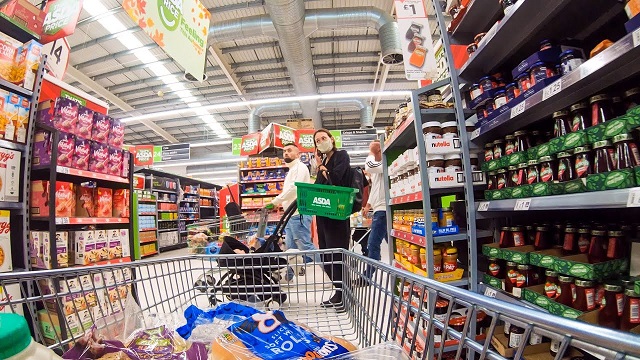
About 44 percent of Britons are having to cut back on food spending as a result of rising food prices
London, UK | Xinhua | British households are being weighed down by a worsening cost-of-living crisis and public skepticism toward the government’s economic policy is on the rise as the country’s inflation returned to its 40-year high in September and is expected to hike further in October and beyond.
BACK TO 40-YEAR HIGH
Pushed up by rising food prices, Britain’s Consumer Price Index (CPI) rose by 10.1 percent in the 12 months to September, up from 9.9 percent in August and returning to July’s 40-year high, said the Office for National Statistics (ONS) on Wednesday.
The rise was driven by further increases in food prices, which saw their largest annual rise in more than 40 years, while hotel prices also increased, said ONS director of economic statistics Darren Morgan.
These rises were partially offset by continued falls in the costs of petrol, with airline prices falling by more than usual for this time of year, and second-hand car prices also rising less steeply than the large increases seen last year, Morgan added.
Inflation was expected to hike further in October as millions of British households are faced with an increase in the energy price cap. In September, the government announced a large-scale support package to offer relief this winter, which is due to end in April 2023.
Unless wholesale gas prices continue to fall very sharply, a rise in the energy price cap to more than 4,500 pounds (5,042 U.S. dollars) may take inflation close to 11 percent next April, said Paul Dales, chief British economist with Capital Economics consultancy.
Plus, though indicators suggest that global goods inflation pressures will soon ease, “it appears that domestic services inflation pressures, which are linked to the tight labour market and high wage growth, are still growing,” Dales added.
To tackle the high inflation, the Bank of England in September increased interest rates by 0.5 percentage points to 2.25 percent, the highest since 2008. It was the seventh successive rise since December 2021 and the second 50-basis-point increase in a row.
The further strengthening of domestic price pressures despite a clear weakening in the economic outlook supports the view that the central bank will deliver a big rate hike to 3.25 percent at its November policy meeting and subsequently increase the rates to 5 percent, Dales said.
WORSENING COST-OF-LIVING CRISIS
“High inflation is the enemy of household finances, as it slashes spending power and erodes savings, making it very hard for people to maintain their living standards,” said analyst Alice Haine at the British investing platform Bestinvest.
A worsening cost-of-living crisis was already visible. A poll carried out for Britain’s Trades Union Congress by the market research company Opinium at the end of September showed that one in seven people across Britain have to skip meals or go without food to make ends meet.
About 44 percent of Britons are having to cut back on food spending, and over half of the population are cutting back on heating, hot water or electricity, said the poll published on Tuesday.
“Prices are more noticeable. (We’re) taking short showers, using the oven less. We have to wash our clothes less often. That’s basically just standard now,” 18-year-old Blendi Gerxhalija, who lives with his parents in London, told Xinhua earlier this month.
Public anger has been escalating. A YouGov survey published last week showed the British public are “overwhelmingly pessimistic” about the government’s handling of the cost-of-living issue. Eight in ten said the government was managing the issue badly, with 55 percent saying it was doing “very badly.”
More than 80 percent said that the British economy is in a bad state at the moment, and there is “very little faith” in the government to be able to turn things around, the survey added. When asked how they think the economy will fare over the next 12 months, 73 percent of Britons expect it to get worse, the survey revealed.
Due to long-running disputes over pay, which have got intensified by high inflation this year, more strikes are on the horizon this winter in Britain after a summer of walkouts by staff in sectors like public transport, container port operation and postal delivery.
Last week, the teachers’ union NASUWT also joined, announcing it would ballot its members for industrial action to guarantee teachers and headteachers a fully-funded real-terms pay award of 12 percent.
At a time when inflation is running at more than 10 percent, the 5-percent pay rise for teachers offered by the government is unacceptable as it “will result in even more financial misery for hardworking teachers,” said NASUWT General Secretary Patrick Roach.
 The Independent Uganda: You get the Truth we Pay the Price
The Independent Uganda: You get the Truth we Pay the Price


